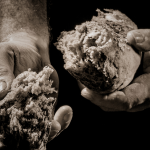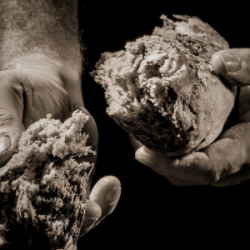
These texts place Jesus on the side of the poor. Jesus, as a prophet of the poor, tells a story about the meaninglessness of hoarding wealth. To what end was all this man’s wealth hoarded? James Robertson, commenting on Jesus’ teaching of wealth redistribution and resource sharing, writes:
Welcome Readers! Please subscribe to Social Jesus Here.
This is Part 2 of The Moral Dilemma and Challenge of Wealth
(Read this series from its beginning here.)
“The human dilemma is, in large part, that we are each other’s fate. We become the tool of evil that ruins another person as we look out for ourselves, having long abandoned any youthful idealism we might once have cherished. But if we each would cease and desist from pushing the other down to keep ourselves up, then the vicious cycle would be broken. Society would become mutually supportive rather than self-destructive. This is what Jesus was up to. Jesus’ message was simple, for he wanted to cut straight through to the point: trust God to look out for you by providing people who will care for you, and listen to him when he calls on you to provide for them. God is somebody you can trust, so give it a try.” (James M. Robinson, The Gospel of Jesus: In Search of the Original Good News, Kindle Edition Loc. 58)
Robinson continues:
“Put in language derived from his sayings: I am hungry because you hoard food. You are cold because I hoard clothing. Our dilemma is that we all hoard supplies in our backpacks and put our trust in our wallets! Such ‘security’ should be replaced by God reigning, which means both what I trust God to do (to activate you to share food with me) and what I hear God telling me to do (to share clothes with you). We should not carry money while bypassing the poor or wear a backpack with extra clothes and food while ignoring the cold and hungry lying in the gutter. This is why the beggars, the hungry, the depressed are fortunate: God, that is, those in whom God rules, those who hearken to God, will care for them. The needy are called upon to trust that God’s reigning is there for them (‘Theirs is the kingdom of God”’).” (James M. Robinson, The Gospel of Jesus: In Search of the Original Good News, Kindle Edition. Loc 71)
These words give us much to think about. Robinson evaluates Jesus’ teachings by what happens in the early church when Christians tried to put them into practice. We’ll take a look at those attempts and what the results mean for us today, next, in Part 3.
Are you receiving all of RHM’s free resources each week?
Begin each day being inspired toward love, compassion, justice and action. Free.
Sign up at HERE.














